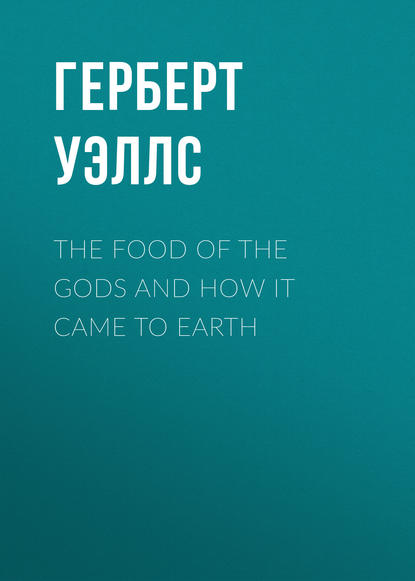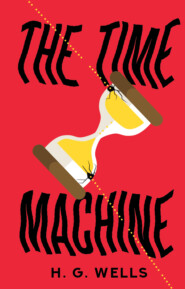По всем вопросам обращайтесь на: info@litportal.ru
(©) 2003-2025.
✖
The Food of the Gods and How It Came to Earth
Настройки чтения
Размер шрифта
Высота строк
Поля
"I will not part." She took his hand. "If this meant death, now, I would not let you go."
"If it meant death," he said, and she felt his grip upon her fingers.
He looked about him as if he feared to see the little people coming as he spoke. And then: "It may mean death."
"Now tell me," she said.
"They tried to stop my coming."
"How?"
"And as I came out of my workshop where I make the Food of the Gods for the Cossars to store in their camp, I found a little officer of police – a man in blue with white clean gloves – who beckoned me to stop. 'This way is closed!' said he. I thought little of that; I went round my workshop to where another road runs west, and there was another officer. 'This road is closed!' he said, and added: 'All the roads are closed!'"
"And then?"
"I argued with him a little. 'They are public roads!' I said.
"'That's it,' said he. 'You spoil them for the public.'
"'Very well,' said I, 'I'll take the fields,' and then, up leapt others from behind a hedge and said, 'These fields are private.'
"'Curse your public and private,' I said, 'I'm going to my Princess,' and I stooped down and picked him up very gently – kicking and shouting – and put him out of my way. In a minute all the fields about me seemed alive with running men. I saw one on horseback galloping beside me and reading something as he rode – shouting it. He finished and turned and galloped away from me – head down. I couldn't make it out. And then behind me I heard the crack of guns."
"Guns!"
"Guns – just as they shoot at the rats. The bullets came through the air with a sound like things tearing: one stung me in the leg."
"And you?"
"Came on to you here and left them shouting and running and shooting behind me. And now – "
"Now?"
"It is only the beginning. They mean that we shall part. Even now they are coming after me."
"We will not."
"No. But if we will not part – then you must come with me to our Brothers."
"Which way?" she said.
"To the east. Yonder is the way my pursuers will be coming. This then is the way we must go. Along this avenue of trees. Let me go first, so that if they are waiting – "
He made a stride, but she had seized his arm.
"No," cried she. "I come close to you, holding you. Perhaps I am royal, perhaps I am sacred. If I hold you – Would God we could fly with my arms about you! – it may be, they will not shoot at you – "
She clasped his shoulder and seized his hand as she spoke; she pressed herself nearer to him. "It may be they will not shoot you," she repeated, and with a sudden passion of tenderness he took her into his arms and kissed her cheek. For a space he held her.
"Even if it is death," she whispered.
She put her hands about his neck and lifted her face to his.
"Dearest, kiss me once more."
He drew her to him. Silently they kissed one another on the lips, and for another moment clung to one another. Then hand in hand, and she striving always to keep her body near to his, they set forward if haply they might reach the camp of refuge the sons of Cossar had made, before the pursuit of the little people overtook them.
And as they crossed the great spaces of the park behind the castle there came horsemen galloping out from among the trees and vainly seeking to keep pace with their giant strides. And presently ahead of them were houses, and men with guns running out of the houses. At the sight of that, though he sought to go on and was even disposed to fight and push through, she made him turn aside towards the south.
As they fled a bullet whipped by them overhead.
CHAPTER THE THIRD
YOUNG CADDLES IN LONDON.
I
All unaware of the trend of events, unaware of the laws that were closing in upon all the Brethren, unaware indeed that there lived a Brother for him on the earth, young Caddles chose this time to come out of his chalk pit and see the world. His brooding came at last to that. There was no answer to all his questions in Cheasing Eyebright; the new Vicar was less luminous even than the old, and the riddle of his pointless labour grew at last to the dimensions of exasperation. "Why should I work in this pit day after day?" he asked. "Why should I walk within bounds and be refused all the wonders of the world beyond there? What have I done, to be condemned to this?"
And one day he stood up, straightened his back, and said in a loud voice, "No!
"I won't," he said, and then with great vigour cursed the pit.
Then, having few words, he sought to express his thought in acts. He took a truck half filled with chalk, lifted it, and flung it, smash, against another. Then he grasped a whole row of empty trucks and spun them down a bank. He sent a huge boulder of chalk bursting among them, and then ripped up a dozen yards of rail with a mighty plunge of his foot. So he commenced the conscientious wrecking of the pit.
"Work all my days," he said, "at this!"
It was an astonishing five minutes for the little geologist he had, in his preoccupation, overlooked. This poor little creature having dodged two boulders by a hairbreadth, got out by the westward corner and fled athwart the hill, with flapping rucksack and twinkling knicker-bockered legs, leaving a trail of Cretaceous echinoderms behind him; while young Caddles, satisfied with the destruction he had achieved, came striding out to fulfil his purpose in the world.
"Work in that old pit, until I die and rot and stink!.. What worm did they think was living in my giant body? Dig chalk for God knows what foolish purpose! Not I!"
The trend of road and railway perhaps, or mere chance it was, turned his face to London, and thither he came striding; over the Downs and athwart the meadows through the hot afternoon, to the infinite amazement of the world. It signified nothing to him that torn posters in red and white bearing various names flapped from every wall and barn; he knew nothing of the electoral revolution that had flung Caterham, "Jack the Giant-killer," into power. It signified nothing to him that every police station along his route had what was known as Caterham's ukase upon its notice board that afternoon, proclaiming that no giant, no person whatever over eight feet in height, should go more than five miles from his "place of location" without a special permission. It signified nothing to him that on his wake belated police officers, not a little relieved to find themselves belated, shook warning handbills at his retreating back. He was going to see what the world had to show him, poor incredulous blockhead, and he did not mean that occasional spirited persons shouting "Hi!" at him should stay his course. He came on down by Rochester and Greenwich towards an ever-thickening aggregation of houses, walking rather slowly now, staring about him and swinging his huge chopper.
People in London had heard something of him before, how that he was idiotic but gentle, and wonderfully managed by Lady Wondershoot's agent and the Vicar; how in his dull way he revered these authorities and was grateful to them for their care of him, and so forth. So that when they learnt from the newspaper placards that afternoon that he also was "on strike," the thing appeared to many of them as a deliberate, concerted act.
"They mean to try our strength," said the men in the trains going home from business.
"Lucky we have Caterham."
"It's in answer to his proclamation."
The men in the clubs were better informed. They clustered round the tape or talked in groups in their smoking-rooms.
"He has no weapons. He would have gone to Sevenoaks if he had been put up to it."
"Caterham will handle him…"
The shopmen told their customers. The waiters in restaurants snatched a moment for an evening paper between the courses. The cabmen read it immediately after the betting news…

















